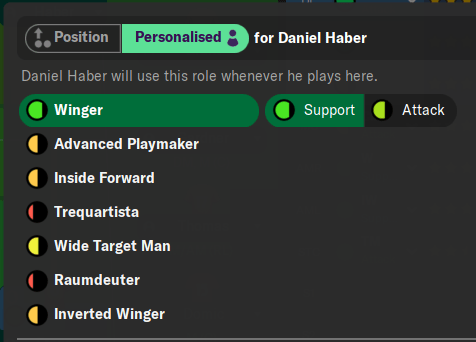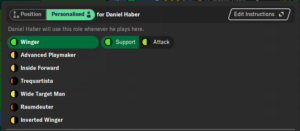
Five Ways to Improve Your Game in Football Manager
I’ve been playing this game steadily since CM 99/00 or so. In that time, I’ve accumulated a certain amount of understanding of the ways the game works, and that understanding has led to a core philosophy, as noted in my first article on this site, Players Are People Too. If you liked that, here are five ways to improve your game that I don’t see other people using very much.
The Relationship Tab
You probably don’t even know this is there. It’s one I don’t think I’ve seen but one YouTuber use (Custard Prophet), and even he did so because I tweeted about its existence. This tab can be found on your Home page, right next to the Promises tab (you’d best already know about that one!). What it contains is what it says on the tin. It lists the relationships you have with the people populating your personal world of football. Media, staff members, players, othe r managers, it’s all here. And so this is where it begins: building relationships.
r managers, it’s all here. And so this is where it begins: building relationships.
Relationships are the key to the style of play I adopt. You build them the same way you build them in real life, by interacting directly with them. There are always many opportunities for this – think how often you have chances to praise or criticize players. How many times you can interact with them: team talks, training praise or criticism, comments you make in the press about them, actions you take with regard to them. Changing their agreed playing time is sure to stir up emotions somewhat, especially if it’s downward.
On this tab, you track these relationships as you build them. The more of your players you can get to have Close or Very Close relationships with you, the better you will find they are to deal with. They’ll trust you more, go the extra mile for you, respond better to shouts, grow more hair, and have less body fat. Some of those may not be true. But paying attention to this tab is a sure way to improve your game.
Superstitions
This is one where I get to annoy everyone, because everyone has their pet theory about why they really lost that big match. Everyone knows the game can hear you, and will respond with gleeful malice every time you say “Well, this is going well!”
Superstitions hurt your game. 
No, wait, hear me out. When you let yourself fall into superstitious thinking, you’re stopping rational thought about the problem. You convince yourself that the FM Gods hate you, or your players are camera-shy, or all kinds of things that can’t possibly be true, rather than admit that somewhere you made a mistake or six. I get it. That’s hard to admit to yourself. Nobody wants to say “I was wrong”, especially when the only person who’d get to gloat about it is you, and bullying yourself like that is just…odd.
But when things go wrong on the field, your responsibility as the manager is to figure out where you screwed up. Did you trust someone you shouldn’t have in a role he wasn’t ready for? If you examine the information the game provides you, the answer is usually there, if not in one game, then in a few certainly. The principle that will help you improve your game is this: the game shows you nothing for nothing.
That is, every piece of information you can get, every slider you operate, it all affects things. I’ve heard people say “Well, Very Attacking simply doesn’t work, it’s just there as a placebo.” No. It’s there as a last resort, throw everything forward. Teams try it every week when they’re losing. Almost always, it fails. You watch the real game. You know this.
We aren’t cave-people. Time we stopped thinking like we were. Your best asset to improve your game is using your brain better, or just more often.
Attribute Interactions
“I don’t get it!” you shout. “He’s got a 15 penalty taking, why does he always miss the big penalties?” Well, simply put, penalty taking isn’t just a matter of the attribute which directly governs it. Like everything in the game, it’s the result of a complex web of interactions, in which the obvious attribute may play a much smaller role than you think.
For our hapless penalty taker, perhaps his Pressure stat is poor. This hidden stat governs a lot of how a player responds to high-pressure situations, like big penalties. So his composure should be looked at. His finishing. His decisions. His determination. It all plays a role in determining how the penalty will go.
You can do this for almost any action a player can take on the field, or off the field for that matter. It’s almost never one thing that’s causing an issue. What this means in practical terms is that when looking for new players, you should be as careful as possible. Consider their mental attributes – do they complement the others? If you want a winger who’s got great dribbling, make sure to check his balance while you’re at it. It’ll all improve your recruitment, which will improve your game.
Personal Instructions
I’m seriously surprised by how few people use these on their tactics screens. I use personalised instructions for each player in each position. I take the time when setting up the tactic to move each player to each position he might realistically play (in the top four on the depth chart), and set up what role he will play and what mentality when he’s playing it.
This means when I bring my players on, I don’t have to  fumble about trying to figure out what role is best for them in this position and situation. Since I generally choose roles by looking at what the player is best at, I can increase the overall familiarity my players will have with the tactic when they come on the field.
fumble about trying to figure out what role is best for them in this position and situation. Since I generally choose roles by looking at what the player is best at, I can increase the overall familiarity my players will have with the tactic when they come on the field.
Team Talks, Press Conferences, and Team Meetings
Ugh. I know. I really do. They’re tiresome, repetitive, and the players often seem to respond in strange and random ways. So we skip them, we send the assistant, we dread the team meeting. I’d argue this is a spot-on job by SI in reproducing the authentic managerial experience of dealing with the press and the players personally, but that doesn’t make it fun.
But if you want to build up those Relationships above, you’ll want to swallow your pride and boredom, and attend your press conferences. Take the team talks yourself. Get advice from your assistant manager, sure, but do the stuff yourself. It will make such a difference in how quickly you build those relationships with the players, and it is my firm belief that a team which is strong in dynamics can play any tactic and pull off wins.
I’ll write again later about what you should be saying at the team talks and team meetings, but it’s worthy of its own article, it’s that important.
Conclusion
If you want to improve your game, this is one way to do it. It’s not the only way. You can absolutely play without paying special attention to dynamics, but you’ll be surprised more often than I will when things go wrong. Your players will be more likely to accept offers to move to other clubs, because they don’t have as strong a relationship with you. Because in the end, that’s the secret you’re trying to invoke: earning their loyalty. When you have that, the game plays on easy mode.
Here are some other articles you may enjoy:
- Players are People too
- How to Get a Head Start in Football Manager
- Red Star Alliance: Shithousing the Shithousers
Follow us on social media: